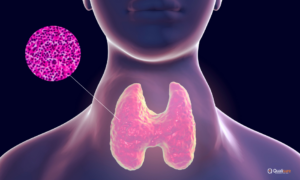Thyroid Lymphoma: A Rare Form of Immune-Related Thyroid Cancer
Thyroid lymphoma is a relatively uncommon type of thyroid cancer that originates from lymphocytes, which are important immune cells. In this blog post, we’ll explore the details of thyroid lymphoma, including its features, how it’s diagnosed, treatment approaches, and prognosis.
Thyroid lymphoma accounts for less than 5% of all thyroid malignancies. It primarily arises from lymphocytes, which play a crucial role in our immune system. There are two main subtypes of thyroid lymphoma: primary thyroid lymphoma (PTL) and secondary or metastatic thyroid lymphoma.
Primary Thyroid Lymphoma
Primary thyroid lymphoma refers to lymphoma that starts in the thyroid gland itself, rather than spreading from other parts of the body. PTL mainly involves the B-cell subtype, with the most common type being diffuse large B-cell lymphoma (DLBCL). It often affects individuals in their 60s or 70s and may present as a rapidly growing thyroid mass.
The exact causes of primary thyroid lymphoma are not fully understood. However, there are a few factors that have been associated with an increased risk of developing this type of cancer. It’s important to note that having these risk factors does not necessarily mean that a person will develop thyroid lymphoma, and individuals without these risk factors can still be diagnosed with the condition. Here are some factors that have been linked to an increased risk:
- Age: Primary thyroid lymphoma is more commonly diagnosed in older adults, usually between the ages of 60 and 70. It is relatively rare in younger individuals.
- Gender: Women are more likely to develop primary thyroid lymphoma compared to men. The reasons for this gender difference are not well understood.
- Autoimmune diseases: Certain autoimmune diseases, such as Hashimoto’s thyroiditis, have been associated with an increased risk of primary thyroid lymphoma. Hashimoto’s thyroiditis is a condition where the immune system mistakenly attacks the thyroid gland.
- Radiation exposure: Previous radiation therapy to the neck or head area, particularly during childhood, has been linked to an increased risk of thyroid cancer, including primary thyroid lymphoma. This risk is more significant in individuals who received radiation therapy many years ago.
Secondary or Metastatic Thyroid Lymphoma:
Secondary or metastatic thyroid lymphoma occurs when lymphoma cells spread to the thyroid gland from other sites in the body, such as lymph nodes or other organs. This type of thyroid lymphoma may involve various subtypes, including B-cell lymphomas (like mantle cell lymphoma) or T-cell lymphomas.
Diagnosis and Staging
Accurate diagnosis of thyroid lymphoma is crucial for determining the appropriate treatment plan. Diagnostic methods may include imaging tests like ultrasound, CT scan, or MRI, fine-needle aspiration biopsy, and histopathological examination. Staging helps determine the extent of the disease, guiding treatment decisions and providing prognostic predictions.
Treatment Approaches
The management of thyroid lymphoma usually involves a combination of treatments, such as chemotherapy, radiation therapy, and, in some cases, surgery. The specific treatment plan depends on factors like the type and stage of the lymphoma, the patient’s overall health, and individual considerations. Comprehensive care involving oncologists, hematologists, and surgeons is important for effective treatment.
Prognosis and Follow-up
The prognosis for thyroid lymphoma varies depending on factors like the type and stage of the lymphoma, response to treatment, and the patient’s overall health. Generally, primary thyroid lymphoma tends to have a more favorable prognosis compared to secondary thyroid lymphoma. Regular follow-up visits, including imaging tests, blood work, and clinical examinations, are crucial for monitoring treatment response and detecting any signs of recurrence.
Conclusion
Thyroid lymphoma is a rare but significant thyroid disorder that requires specialized care. Understanding the features, diagnostic methods, and treatment approaches specific to thyroid lymphoma helps healthcare professionals and patients navigate this complex disease more effectively. With early diagnosis, appropriate treatment, and regular follow-up, we can improve outcomes for individuals affected by thyroid lymphoma.
If you or someone you know experiences symptoms like a rapidly growing thyroid mass, hoarseness, or difficulty swallowing, it is crucial to consult with a healthcare professional who specializes in thyroid disorders promptly. By raising awareness, promoting research, and providing support, we can continue to make progress in the diagnosis, treatment, and management of thyroid lymphoma, offering hope to those affected by this unusual form of thyroid cancer.

